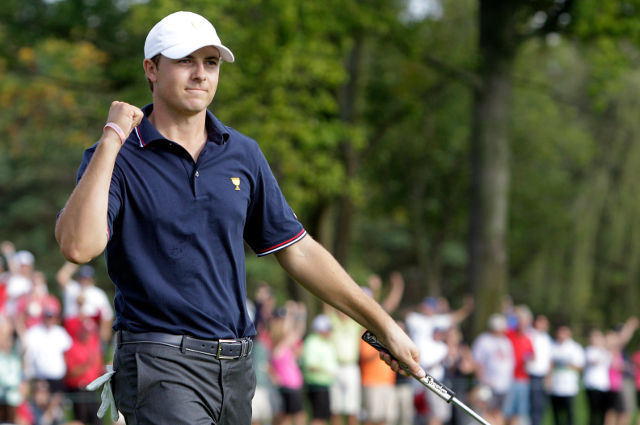For Former UT Golfer Spieth, Success Comes Sooner (and Bigger) Than Expected

Jordan Spieth celebrates a birdie putt at the Presidents Cup in Dublin, Ohio, on Oct. 3. Spieth, a 20-year-old former University of Texas golfer, has become one of pro golf’s top young stars. Photo by Jay LaPrete/AP.
By Brittany Lamas
For Reporting Texas
Jordan Spieth always said he knew he would win on the PGA Tour, though maybe not before he was eligible for a University of Texas class ring.
Spieth, 20, spent a year and a semester at UT. The two-time winner of the U.S. Junior Championship played as a freshman on the team that won the 2012 NCAA Division I national championship, the Longhorns’ first since 1972. He returned for his sophomore season intending to play on the PGA Tour as soon as possible.
He did that in December 2012.
Spieth declared himself a professional, then played a PGA tournament in January at Torrey Pines Golf Course in La Jolla, Calif. He missed the cut.
Less than two months later, Spieth tied for second at a PGA Tour event in Puerto Rico. He finished with a share of seventh place a week later in Florida. Then he made history in July, when he won the John Deere Classic, becoming the youngest winner of a tour event in 82 years – a period that includes the Hall of Fame careers of Ben Hogan, Arnold Palmer, Jack Nicklaus and Tiger Woods.
In the span of seven months, Spieth went from sitting in an English class to sitting on the top of the golf world, winning praise from the most elite players in history, from Woods to Phil Mickelson to Nicklaus. With that came a new kind of life in the game Spieth took up as a boy in Dallas.
Many young golfers – former UT national champion, two-time Masters champion and lifelong Austin resident Ben Crenshaw, for example–leave college early for the professional tours. Many, like Spieth, do so without the kind of guarantee that comes from placing high enough at the annual PGA Tour qualifying tournament to earn full PGA Tour membership.
Spieth played well enough as a rookie to secure his tour card by the middle of the season. That happens, said UT Golf Club professional Jean-Paul Hebert.
“It’s just not often at that age,” he said.
Hebert tried the golf tours for eight years after he graduated from UT in 1994. He understands the dramatic change professional golf brings to a young man’s life.
So does Spieth. “It’s just an incredible difference with the amount of time you spend at a course in a day on tour than in a day in college,” the reigning PGA Tour rookie of the year said.
“Being on a course from about 7:30 to 5 on a day preparing for a tournament, and in college I really got out there around noon and was there until 4:30, so it’s at least double the amount of time in a day,” Spieth said.
The extra work paid off. Spieth earned $3.88 million in his first season on the tour, the kind of money most college sophomores never expect to see.
Spieth’s career compares best to that of other former Longhorns Crenshaw and Justin Leonard, said John Fields, head coach of the UT men’s golf team. Leonard played four seasons at Texas in the early 1990s, when he earned an individual NCAA championship and won the 1992 U.S. Amateur. Crenshaw won three national championships at UT, from 1971 to 1973, and won the first start of a career that included 19 tour titles.
“This ultra-successful (first season) is extraordinary for sure,” Fields said.
Crenshaw, Leonard and Spieth found success early in their careers. They all learned to adjust quickly to celebrity and the pressures of stardom.
Spieth used to do little more than exercise, go to class and practice in the afternoons. Now, on a typical day, Spieth is at the driving range by 8 a.m., where a full day in golf begins.
He starts with other tour professionals for an 18-hole round. After lunch, it’s back to the course to work on issues he noticed, such as adjustment to a new course and different types of grass. He sees the chiropractor for treatment to keep his back aligned, generally wrapping up his golf day about 5 p.m.
After that, his day is open for fly fishing in West Virginia or catching a baseball game at Fenway Park in Boston or hanging out and throwing a football on a beach in Panama.
A year ago, a typical day meant Spieth and his teammates had homework to finish after practice, so the group would go to the athletic study hall in the north end zone of the football stadium. Along with homework, sometimes the guys would find a place to watch games on TV.
“At the end of the day a lot of times, if it’s been a few weeks at a time, I’ll sit back on a normal day, and I miss school. I really do,” Spieth said. “I miss school. I miss hanging out with my buddies that weren’t golfers, and I miss hanging out with the guys on the team.”
To end his historic year, Spieth competed in the Presidents Cup in October as the youngest player to ever play for the U.S team.
The U.S. won the team competition, and Spieth finished 2-2 in his matches.
“He’s earned his way on here, and he’s played exceptional golf,” Tiger Woods said at the Presidents Cup. “His talent is going to take him a long way over the years.”
Golf took Spieth a long way in 2013. He started the year ranked No. 810 in the world. He finished No. 20. Spieth played in four countries, 15 states and Puerto Rico.
“It’s definitely a different world than it was in Austin,” Spieth said. “I do miss the world in Austin a lot, but I’m having a blast doing this, too.”